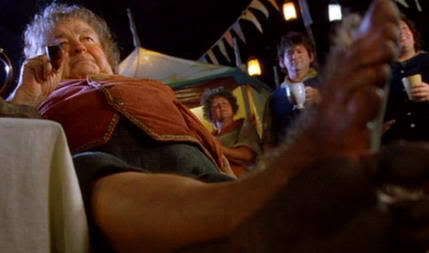In that thread Brian quote from http://www.etymonline.com/columns/tolkien.htm
A year ago I was at a Tolkien Seminar in Birmingham, and I remember one of the precenters used half an hour to refute the above statements, and he did so in a very convincing way. Here's what it says in the programme:"The closest I have ever gotten to the secret and inner Tolkien," Davenport writes, "was in a casual conversation on a snowy day in Shelbyville, Kentucky. I forget how in the world we came to talk of Tolkien at all, but I began plying questions as soon as I knew that I was talking to a man who had been at Oxford as a classmate of Ronald Tolkien's. He was a history teacher, Allen Barnett. He had never read The Hobbit or The Lord of the Rings. Indeed, he was astonished and pleased to know that his friend of so many years ago had made a name for himself as a writer.
" 'Imagine that! You know, he used to have the most extraordinary interest in the people here in Kentucky. He could never get enough of my tales of Kentucky folk. He used to make me repeat family names like Barefoot and Boffin and Baggins and good country names like that.'
"And out the window I could see tobacco barns. The charming anachronism of the hobbits' pipes suddenly made sense in a new way. The Shire and its settled manners and shy hobbits have many antecedents in folklore and in reality .... Kentucky, it seems, contributed its share.
"Practically all the names of Tolkien's hobbits are listed in my Lexington phone book, and those that aren't can be found over in Shelbyville. Like as not, they grow and cure pipe-weed for a living. Talk with them, and their turns of phrase are pure hobbit: 'I hear tell,' 'right agin,' 'so Mr. Frodo is his first and second cousin, once removed either way,' 'this very month as is.' These are English locutions, of course, but ones that are heard oftener now in Kentucky than in England.
"I despaired of trying to tell Barnett what his talk of Kentucky folk became in Tolkien's imagination. I urged him to read The Lord of the Rings but as our paths have never crossed again, I don't know that he did. Nor if he knew that he created by an Oxford fire and in walks along the Cherwell and Isis the Bagginses, Boffins, Tooks, Brandybucks, Grubbs, Burrowses, Goodbodies, and Proudfoots (or Proudfeet, as a branch of the family will have it) who were, we are told, the special study of Gandalf the Grey, the only wizard who was interested in their bashful and countrified ways."
Now I'm confused, is Davenport's story authentic? I'm inclined to believe Bratman over Davenport as Tolkien is so very english and doesn't seem to be much interested in America or Americans.Hobbit Names Aren't From Kentucky - David Bratman
In this paper I trace the origin of the claim that hobbit surnames came from Tolkien hearing a friend's tales of Kentucky country folk; regardless of the truth of this, I ask whether hobbit surnames are either distinctive to or characteristic of Kentucky, and as the title suggest answer this question with a firm no. I also discuss possible local echoes of parts of England in hobbit surnames, and their significance.
What does y'all think? who's right Davenport or Bratman?



